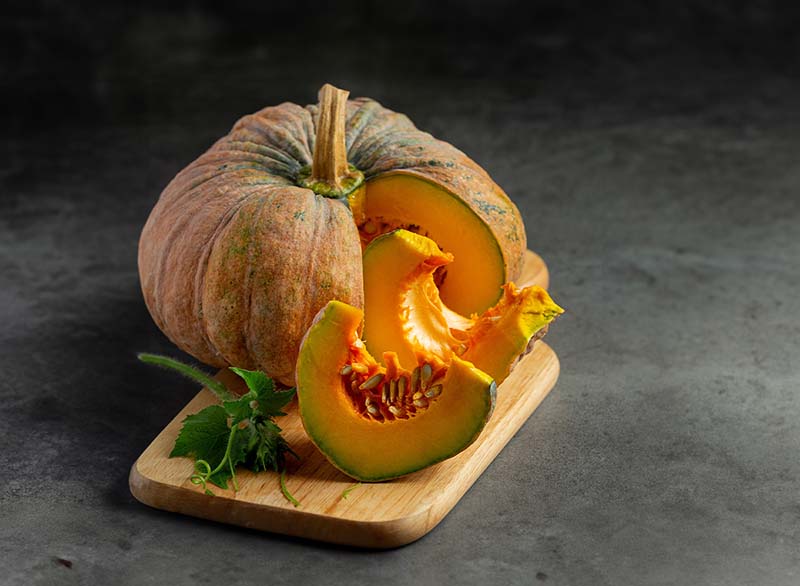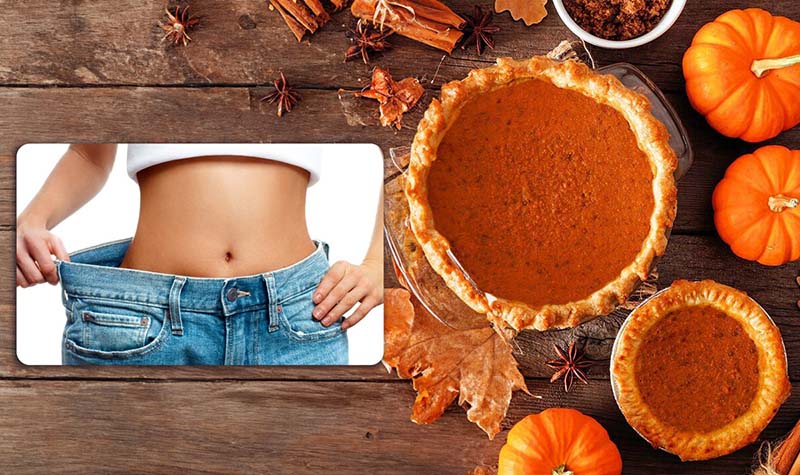Pumpkins are an undeniable autumn favorite, gracing our decorations and menus throughout the season. Amidst the sugar-laden pumpkin treats of fall, it’s crucial to remember that pumpkins themselves are a nutritious dietary addition.
In fact, when wisely integrated into your meals, pumpkins can be beneficial for a healthy eating regimen and may even aid in weight loss. So “Is Pumpkin Good for Weight Loss?” Let’s explore the right way to include pumpkins in your diet to maximize their health advantages.
Read more
- Are Deviled Eggs Good for Weight Loss? Nutritional Facts.
- Is Edamame Good for Weight Loss? Benefits of Edamame.
- Is Greek Yogurt Good for Weight Loss? Shed Pounds Creamily.
Is Pumpkin Good for Weight Loss?
Pumpkin stands out as an excellent choice for those seeking to lose weight, thanks to its impressive low-calorie profile while being densely packed with nutrients. Comprising about 94% water, pumpkin offers less than 50 calories per cup. This makes it a go-to option for anyone aiming to manage their calorie intake without sacrificing volume. Unlike other carbohydrate sources, you can enjoy pumpkin in more generous portions without the guilt.
One of the key aspects of pumpkin is its high fiber content. Fiber plays a crucial role in weight management as it helps in suppressing hunger, thereby reducing overall calorie intake. This feeling of satiety is essential for those looking to cut down on snacking or overeating.
But the benefits of pumpkin extend beyond just weight loss. It’s a powerhouse of vitamins, minerals, and antioxidants, contributing significantly to boosting your immune system. Regular consumption of pumpkin can be beneficial for your eyesight, potentially lowering the risk of certain types of cancers. It’s also great for heart health and maintaining vibrant skin.
The potassium content in pumpkin is noteworthy, especially for fitness enthusiasts. Potassium aids in muscle recovery, making pumpkin a great post-workout food choice. Moreover, it contains tryptophan, an amino acid that’s instrumental in elevating mood and combating stress. Since stress and mood swings can often lead to unhealthy eating habits, incorporating pumpkin into your diet can be a strategic move for maintaining a balanced weight.
Incorporating pumpkin into your diet is not just a seasonal trend but a smart, health-conscious decision. Whether you’re aiming to shed a few pounds or simply looking to enrich your diet with nutritious foods, pumpkin is a versatile and delicious choice to consider.

Nutrient Profile of Pumpkin
Let’s break down the nutrient profile of pumpkin per 100 grams, so you can appreciate its nutritional value:
- Water Content (91.6g): Pumpkin is mostly water, which means it’s hydrating and helps keep you feeling full without adding extra calories.
- Energy (26kcal): Pumpkin is low in calories, making it an excellent choice for weight-conscious individuals.
- Protein (1g): While not a significant source of protein, pumpkin still contributes a bit to your daily intake. It’s more about its other benefits.
- Fiber (0.5g): Pumpkin contains a modest amount of fiber. This dietary fiber is essential for digestive health and can help control your appetite.
- Calcium (21g): Pumpkin provides some calcium, which is important for maintaining strong bones and teeth.
- Vitamin C (9mg): This vitamin is known for its immune-boosting properties and plays a role in collagen production for healthy skin and joints.
- Magnesium (12mg): Magnesium is crucial for various bodily functions, including muscle and nerve function, blood glucose control, and bone health.
So, even though pumpkin might not be a nutritional powerhouse in every category, it offers several health benefits and can be a valuable addition to your diet, particularly for its low-calorie, hydrating, and fiber.
How Pumpkin Supports Weight Loss
Let’s explore how pumpkin supports your weight loss journey with some straightforward explanations:
High Fiber Levels
Pumpkin is a weight loss champion because it’s rich in dietary fiber. In every 100 grams of pumpkin, you’ll find about 0.5 grams of fiber. This might not seem like much, but when you enjoy a cup of pumpkin, you’re getting around 3 grams of fiber with just 49 calories. Fiber is crucial for your digestive health, not only aiding in weight loss but also helping you feel less hungry.
Nutrient-Dense Vegetable
Despite its low calorie count, pumpkin is packed with essential nutrients. It’s loaded with vitamins A, C, and E, along with minerals like potassium. These nutrients are not only great for your overall health but can also support your weight loss efforts.
Low Calorie Content
Pumpkin is what we call a “nutrient-dense” food. It’s low in calories but high in essential nutrients. A cup of pumpkin, which is around 245 grams, contains less than 50 calories because it’s about 94% water. This makes pumpkin an excellent choice for weight management since you can enjoy larger servings compared to many other carb-heavy foods.
Rich in Antioxidants
Pumpkin boasts antioxidants like beta-carotene (which gives it that vibrant orange color), as well as vitamins C and E. These antioxidants work to neutralize harmful free radicals in your body. This is crucial because free radicals are associated with chronic diseases and aging.
Low Glycemic Index
Foods with a low glycemic index, like pumpkin, release glucose into your bloodstream gradually. This means they help maintain stable blood sugar levels, preventing those sudden spikes and crashes that can trigger increased hunger and cravings.
Abundant in Water
Pumpkin is incredibly hydrating, with a water content of about 94%. This not only helps you feel full but also supports your overall hydration, aiding in digestion and maintaining your body temperature. Plus, it helps in weight management by preventing you from confusing thirst with hunger. The fiber in pumpkin (around 2.7 grams per cup) absorbs water, slowing down digestion and helping control your appetite.
Additional Health Advantages of Pumpkin
Pumpkin offers a multitude of health advantages beyond just aiding in weight loss and management. Its nutritional profile, including vitamins, minerals, fiber, and antioxidants, makes it a versatile and healthful addition to your diet. Here are some additional health benefits of pumpkin:
Contribute to the management of chronic diseases
Excessive free radicals in the body can lead to oxidative stress, linked to chronic diseases such as heart disease and cancer. Pumpkin contains antioxidants like alpha-carotene, beta-carotene, and beta-cryptoxanthin, which can neutralize these free radicals and protect your cells. While more research is needed, studies suggest that these antioxidants may help prevent conditions like cancer, eye diseases, and more.
Enhance skin health
Pumpkin is a skin-friendly food. It’s rich in carotenoids like beta-carotene, which your body converts into vitamin A. These carotenoids act as a natural sunblock and help protect your skin from harmful UV rays. Additionally, pumpkin’s vitamin C content is essential for maintaining healthy skin by promoting collagen production. Its antioxidants like lutein and zeaxanthin further boost your skin’s defense against UV rays.

Very versatile to incorporate into your diet
Pumpkin isn’t just nutritious; it’s delicious and incredibly versatile. You can use it in both sweet and savory dishes, from custards and pies to roasted vegetables, soups, and pastas. Pumpkin seeds are also edible and packed with nutrients, offering benefits such as improved bladder and heart health. You can find pumpkin pre-cut or canned, providing flexibility in your recipes.
Support cardiovascular health
Pumpkin contains nutrients like potassium, vitamin C, and fiber, which are associated with heart health. Studies suggest that higher potassium intake may lower blood pressure and reduce the risk of strokes, both risk factors for heart disease. Additionally, pumpkin’s antioxidants may protect “bad” LDL cholesterol from oxidation, which can contribute to heart disease.

Reduce the risk of cancer
Carotenoids found in pumpkin function as antioxidants, neutralizing free radicals that cancer cells produce to multiply rapidly. These carotenoids, like alpha-carotene and beta-carotene, have been linked to lower risks of various cancers, including stomach, throat, pancreas, and breast cancer. However, more research is needed to determine the exact mechanisms at play.
Promotes healthy vision
As we age, eyesight can decline. Pumpkin provides essential nutrients linked to maintaining strong eyesight. Beta-carotene in pumpkin is converted into vitamin A, which is crucial for preventing blindness. Lutein and zeaxanthin, present in pumpkin, lower the risk of age-related macular degeneration (AMD) and cataracts. Vitamins C and E, along with antioxidants, protect eye cells from damage.

Rich in nutrients with high vitamin A content
Pumpkin’s beta-carotene is converted into vitamin A, essential for the proper functioning of the eyes, including the cornea’s function of focusing light. Vitamin A also supports various other body parts like skin, bones, lungs, and kidneys. Pumpkin is an excellent source of beta-carotene and vitamin A, best obtained through dietary sources like pumpkin rather than supplements.
Contains vitamins that support immune function
Pumpkin is a powerhouse of immune-boosting nutrients. It’s high in beta-carotene, which your body converts into vitamin A. Vitamin A strengthens the immune system and helps combat infections. Pumpkin also boasts vitamin C, known to enhance white blood cell production, improve immune cell effectiveness, and promote faster wound healing. Additionally, pumpkin provides vitamin E, iron, and folate, all of which contribute to a robust immune system.
Potential Side Effects of Pumpkin
Pumpkin is generally safe to consume, and there are no specific side effects associated with its consumption. However, excessive intake of pumpkin or pumpkin seeds may lead to some potential side effects, including:
- Stomach Discomfort: Overconsumption of pumpkin seeds can lead to stomach aches. These seeds are high in fatty oils, and ingesting them beyond acceptable levels may cause stomach upset, cramps, and pain.
- Loss of Water-Soluble Nutrients: Crisply cooked pumpkin seeds may lose water-soluble nutrients like vitamin B6, thiamin, vitamin B12, and vitamin C. To retain these nutrients, it’s advisable to cook pumpkin seeds at the lowest possible heat or consider consuming them in their raw form.
- Not Suitable for Infants: Pumpkin seeds are rich in fiber and fatty acids, which are not recommended for infants. Their consumption in infants can lead to stomach cramps, pain, vomiting, and even diarrhea.
- Blood Pressure Concerns: Due to their natural antioxidant content, pumpkin seeds may lower blood pressure levels. If you have issues with blood pressure, such as hypotension or if you are taking anti-hypertensive medications, it’s advisable to consult with a doctor before incorporating pumpkin seeds into your diet.
- Allergic Reactions: Some individuals may experience allergic reactions to pumpkin seeds, with skin contact being the primary trigger. Allergic symptoms can include itching, throat irritation, coughing, obstructed breathing, headache, nasal congestion, and sneezing. If you suspect an allergy, it’s important to seek medical attention.
- Blood Glucose Regulation: Pumpkin seeds have the potential to lower blood glucose levels, which can be beneficial for some but a concern for others. If you are on anti-diabetic medications or have hypoglycemia, it’s advisable to consult with a healthcare professional before including pumpkin seeds in your diet.
Does Pumpkin Make You Gain Weight?
Pumpkin does not inherently cause weight gain; in fact, it can be a valuable addition to a weight-loss-friendly diet due to its low calorie yet nutrient-rich composition. Containing fewer than 50 calories per cup (245 grams), pumpkin allows for the consumption of larger portions without significantly increasing calorie intake. Rich in essential nutrients like beta-carotene, vitamins A and C, minerals such as potassium, and dietary fiber, pumpkin supports overall health and aids in weight loss.
The fiber in pumpkin aids digestion, promotes fullness, and helps control appetite, which is crucial for maintaining a healthy weight. Additionally, the bold orange color of ripe pumpkin, indicative of a high beta-carotene content, points to its powerful antioxidant properties that protect cells from damage and support overall health.

Conclusion
In conclusion, the question “Is pumpkin good for weight loss?” has been answered with a resounding yes. With its low calorie count, high fiber content, and array of essential nutrients, pumpkin can be your secret weapon for shedding pounds while enjoying the flavors of autumn.
Have your own pumpkin success story or a delicious pumpkin recipe to share? We’d love to hear from you! Share your experiences in the comments below. And for more insightful articles on health and nutrition, don’t forget to explore our other blogs at Sure Life Health. Discover the power of healthy living with us.
Professor Gaye Cunnane, PhD, MB, FRCPI
As the Director of Health and Wellbeing at RCPI, Professor Gaye Cunnane is at the helm of initiatives aimed at enhancing the health and well-being of RCPI Trainers and Trainees. Her role extends beyond administration; she is also a respected clinical professor of rheumatology and a consultant rheumatologist at Trinity College Dublin (TCD) and St James’s Hospital. Prof. Cunnane’s medical journey began at TCD, where she graduated from medical school, and her path has been marked by both clinical and academic excellence.
After completing her basic clinical training in medicine, she embarked on PhD studies at University College Dublin and St Vincent’s University Hospital. Her research during this period was focused on prognostic markers in early inflammatory arthritis, a project that saw her collaborating with esteemed universities across Europe, including in Switzerland, The Netherlands, the UK, and Sweden.
Prof. Cunnane’s career took her to the University of California, San Francisco, where she spent three years delving into research on new treatments for lupus. Her academic prowess led her to the University of Leeds in 2001 as a senior lecturer, before returning to Ireland in 2003 to assume her current roles. She has also served as the National Specialty Director for Rheumatology training in Ireland, Programme Director for Basic Specialist Training with RCPI, and as a past President of the Irish Society for Rheumatology.
PUBLISHED ARTICLES
“Rheumatic disease differentiation using immunoglobulin G sugar printing by high-density electrophoresis”: Published in The Journal of Rheumatology, this study reflects her in-depth investigation into rheumatic diseases.
“Benefits of exercise in patients with rheumatoid arthritis: a randomized controlled trial”: This research work, highlighting the positive impact of exercise on rheumatoid arthritis, underscores Prof. Cunnane’s dedication to practical, patient-centered research.
Additionally, Prof. Cunnane has made notable contributions to the Annals of the Rheumatic Diseases, discussing early referral, diagnosis, and treatment of rheumatoid arthritis. She has also been involved in a study on the NCBI platform investigating exercise benefits in rheumatoid arthritis patients.
Professor Gaye Cunnane’s career is a testament to her commitment to improving patient outcomes in rheumatology through rigorous research, clinical excellence, and dedicated teaching. Her work continues to influence the field of rheumatology, both in Ireland and internationally.

